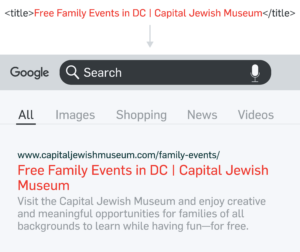
How We Helped Capital Jewish Museum Improve Appearance and CTR on Google with Bespoke SEO Tags
Services We Provided:
Search Engine Optimization77%
increase in clicks
94%
increase in clicks to the homepage
197%
increase in clicks to the visit page
80%
increase in overall click-through rate
The Lillian and Albert Small Capital Jewish Museum (Capital Jewish Museum) explores the Jewish experience in the national capital region, connecting the past to the present through thought-provoking exhibitions, dynamic programming, and creative educational and public offerings. They opened their doors in 2023 in one of the most popular museum cities in the country, which meant that a key challenge for them would be appearing on Google’s search engine results page (SERP) for highly competitive non-branded, museum-related terms like “museums in washington dc”.
Capacity Interactive partnered with the Capital Jewish Museum starting in Fall 2023 to optimize their SEO tag creation. Our strategic SEO partnership helped improve their visibility and CTR on the SERP.
How Title Tags introduce searchers to your website
If your website is your organization’s digital home, then Google is your front lawn—and Title Tags are your way of greeting your patrons at the door, letting them know they’re at the right place, and welcoming them inside. As one of the most fundamental parts of SEO, Title Tags help search engines understand webpage content and influence how your site appears in search results. A well-optimized Title Tag can improve visibility, increase click-through rate, and contribute to overall rankings.
So, what exactly is a Title Tag? It’s a snippet of code in the HTML of your site that Google often uses to create the clickable headline of your page that appears on the SERP.

A well-crafted Title Tag should include relevant keywords to your organization and offerings, describe the content that’s on the page, and be unique to each page, all while staying within the 60-character limit.
How Meta Descriptions Influence Clicks
A Meta Description is a brief summary of your page’s content that appears below the Title Tag on the SERP. While it doesn’t directly impact rankings, a well-written Meta Description can significantly influence whether users click on your link. A strong Meta Description should include relevant keywords, provide a compelling overview of the page, and align with user intent, all within the 160-character limit. It’s your opportunity to give users a quick preview of what they’ll find on the page and encourage them to explore further.
Here is an example of the Capital Jewish Museum’s homepage Title Tag and Meta Description when we began our SEO partnership:

Let’s take a look at the Title Tag first. This isn‘t a terrible Title Tag—it includes the brand/organization name, which helps with brand recognition. However, it lacks information about the organization itself, which may make searchers less likely to click on the link, and it is cut off at the end.
Now look at the Meta Description. Because the page didn’t have one already, it was auto-populating text from the landing page. That may sound great in theory, but as you can see, this Meta Description was being cut off on the SERP as it didn’t fit within the 160-character limit. In addition, it didn’t give potential visitors a succinct or enticing summary of the page.
CI’s APPROACH TO SEO Tag Creation
When creating tags for the Capital Jewish Museum, we needed to consider several aspects, including ranking, CTR, and appearance on the SERP. We created bespoke Title Tag and Meta Description options for key pages across the site that considered what people would be searching for, and how the pages are best presented on Google.
With that in mind, we created the following Title Tag and Meta Description combination. This hits on all of our aims. It has the branded term, it features D.C., and it has official language front and center. It also includes the term “Museum in Washington D.C.” which will assist with non-branded searches for people looking for museums.

The Importance of Non-Branded Traffic
Results that rank highly for non-branded search terms help attract new audiences who may not yet know about your organization. By ranking well for non-branded keywords, you expand your visibility, grow your organic traffic, and increase the likelihood of gaining new patrons or customers beyond those already familiar with your brand.
Capital Jewish Museum has a distinct advantage with its brand name, which has a non-branded component “jewish museum”. This allowed us to seamlessly incorporate highly relevant, search-first terms into their SEO tag strategy.
The number of times the Capital Jewish Museum’s site appeared on the SERP, referred to as impressions, for the non-branded term “jewish museum dc” increased by 21%. Meanwhile, clicks increased by 113%, which led to a 76% higher click-through rate. This demonstrates how implementing relevant keywords can improve your appearence on the SERP, leading to increased organic performance.
The Impact
In the three months following the new tag implementation across the site, the Capital Jewish Museum saw a 77% increase in clicks. Impressions remained steady, which led to an 80% increase in overall click-through rate.
Let’s get a little bit more granular, shall we?
- While clicks to the site overall increased by 77%, clicks to the homepage increased by 94%, and clicks to the Visit page increased by 197%.
- This is an important component of optimizing your organic branded search strategy. If someone is searching for your brand, Google is smart enough to know that they should display your organization’s site on the SERP, but optimizing your site for branded search is about making sure that they are served to the correct landing page.
- The Visit page has crucial information for searchers who have a high intent to visit the museum, so we want to present them with options on the SERP. The Visit page’s click-through rate improved from 1.9% to 4.2%, an increase of 121%.
What Aspects of Our Tags Improved CTR?
By incorporating the geographic term “DC”, we added the phrase “jewish museum dc” naturally to many tags. This impacts ranking by letting Google know that Capital Jewish Museum has relevant search results for that phrase.
Takeaways
The above just scratches the surface of SEO. Beyond tag creation, there are hundreds of factors that go into optimizing your site for organic search. This can include using search-first blog content effectively, avoiding recurring events from competing against each other for SERP space, also known as The Nutcracker Problem, or something as simple as doing keyword research for any new landing page on your site.
Title Tags and Meta Descriptions are incredibly important and should be prioritized—refining them can have massive impacts on CTR and clicks to your organization’s site. The best thing you can do for your organic search performance is to start simple. Begin by auditing the most crucial pages on your site to make sure their Title Tags and Meta Descriptions are designed with search engines and your patrons in mind.
Ready to optimize your site for organic search?
If you think you’d like help tackling your site’s SEO, reach out to our SEO experts and explore how to elevate your search-first strategies.
Explore more

144% Increase in Organic Traffic
McCallum Theatre

